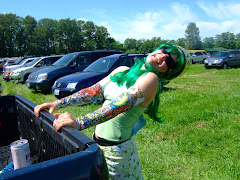Laura Lippman, who is one of my favorite mystery writers. Lippman, a former journalist, is the author of numerous award-winning novels, including those featuring her journalist-turned-detective character, Tess Monaghan, and several stand-alone novels. As an added bonus, Lippman appears Wednesday night in Bellingham to read at the
Chuckanut Radio Hour.Another Thing to Fall © 2008Baltimore detective Tess Monaghan is hired to provide security for the young star of a TV show being filmed in Baltimore after a series of mysterious incidents plagues the cast and crew. But when a member of the production company is murdered at the set, she finds herself embroiled in a complicated investigation that may or may not point to writers on the show, a bizarre photographer stalking the star, and several others who have motive to see the show fail.
Details about the television industry, in particular the writing and creation of a show, made this book of special interest to me, but the mystery, and especially the characters, will make this an intriguing read for anyone.
What the Dead Know © 2007Thirty years ago, two sisters disappeared from a local shopping mall and were never seen again. No bodies were ever found, but it has long been assumed that the girls were murdered. But now a woman has returned to Baltimore, claiming to be one of the missing Bethany sisters. She knows a great deal about the crimes, and the two girls’ lives, but is she who she says she is? And if so, why has she just now reappeared. If she isn’t one of the missing children, why is she pretending to be someone she’s not?
Every Secret Thing © 2003Two young girls, banished from a birthday party, walk home and encounter what appears to be an abandoned baby stroller—with a baby in it. In a misguided attempt to be helpful, they take the stroller, and the ensuing events destroy three families.
Now it’s seven years later, and the two girls are returning home after punishment. Advised not to contact each other, they are given new histories and identities and a chance to start fresh. But the past has a way of returning…
 Snowbound for days, you would reasonably assume that I did nothing but read pile after pile of books, gleefully thankful that my mini-van was undriveable, work unaccessible, and the outside world an unreachable, distant memory. Not so much.
Snowbound for days, you would reasonably assume that I did nothing but read pile after pile of books, gleefully thankful that my mini-van was undriveable, work unaccessible, and the outside world an unreachable, distant memory. Not so much.

















